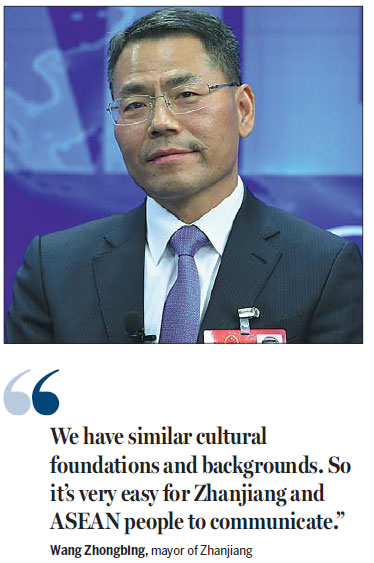Home> Highlights
A two-way path to economic growth
By Erik Nilsson and Zhao Huanxin(China Daily) Updated: 2016-03-11
Port city widens cooperation with ASEAN countries, Erik Nilsson and Zhao Huanxin report.
T he port city of Zhanjiang is intensifying its opening-up by enhancing cooperation with Association of Southeast Asian Nations countries, its mayor Wang Zhongbing said.
The southernmost city of Guangdong province envisions expanded partnerships with the 10-member bloc in such realms as port logistics, aquaculture, modern agriculture and tourism, Wang told China Daily.
"It is a two-way opening up," Wang said.
Zhanjiang has been designated as one of the pivot cities of China's Belt and Road Initiative. It has capital and human-resource advantages, and is a market for ASEAN members' farm produce and travelers, the mayor said.
Wang, who is also a deputy of the National People's Congress, the country's top legislature, is in Beijing attending a 12-day annual legislative session that concludes on Wednesday.
He said he was encouraged by Premier Li Keqiang's pledge to carry out a new phase of opening-up and mutually beneficial cooperation.
The premier told the legislative session on Saturday: "We will ensure that the Belt and Road Initiative creates bonds of peace, friendship and common prosperity."
The Belt and Road Initiative proposed by China refers to the Silk Road Economic Belt that links China with Europe through central and western Asia, and the 21st Century Maritime Silk Road that connects China with Southeast Asia, Africa and Europe.
China sees the ASEAN bloc as a preferred partner of the "Belt and Road" cooperation, Foreign Minister Wang Yi said on Tuesday.
Zhanjiang is well positioned geographically and culturally, its mayor said.
"We're very close. The distance of Zhanjiang to ASEAN countries is the shortest by sea and air," he said.
"We have similar cultural foundations and backgrounds. So it's very easy for Zhanjiang and ASEAN people to communicate."
By last year, Zhanjiang had invested $634 million to set up 11 enterprises in ASEAN countries. The outlay accounted for 91 percent of the city's total foreign investment, the mayor said.
Bilateral trade nearly doubled over the past five years to nearly $800 million last year at an average annual increase of 18.6 percent, the city's Customs statistics showed.
Wang, who visited Indonesia, Thailand and Cambodia in December, said he strongly felt the friendly ties between China and ASEAN members and the prospects for win-win cooperation.
Zhanjiang set up a trade representative office in Cambodia in 2014 and opened another in Thailand during the mayor's visit.
It has supported investment in ASEAN countries by the city's construction firms; its electrical-appliance, sugar and feed producers; and its seafood and farm-produce processors.
Zhanjiang, in turn, encourages ASEAN businesspeople to open industrial parks in the city's Fenyong New and High-Tech Development Zone, the mayor said. A wholesale and demonstration center for tropical agricultural products from ASEAN countries will open in Zhanjiang within the year, he said.
Thailand and Indonesia are expected to participate in the 2016 Aquatic Exposition and the 2016 China Marine Economy Expo in Zhanjiang, the mayor added.
Thailand will, for the first time, set up a national pavilion as guest country of honor at this year's marine expo, he said.
Days before arriving in Beijing for the legislative session, the mayor had traveled to Northeast China's Changchun, capital of Jilin province, and Heilongjiang province's Qiqihar city to promote tourism.
"With pristine air, clean beaches and pollution-free seafood, Zhanjiang has every reason to become an ideal (winter) destination for the northeasterners," Wang said.
Zhanjiang will subsidize travel agencies and create systems to allow tourists to enjoy the same pensions and healthcare as in their own cities, Wang said.
The mayor also said the Baosteel's massive steel and iron plant in Zhanjiang, which started trial operations in September, has been running smoothly. It has not emitted any pollution thanks to what he called the "world's strictest" prevention measures.
"Our goal is to have residents in Zhanjiang enjoy a better life, education, stable jobs, more satisfying income, more reliable social security and better social services," he said.
Achieving this requires innovation, he said.
For example, it had been difficult for Zhanjiang's rural residents to get healthcare.
"We found that the town hospitals and the village clinics were short of medicine, equipment and management," he said. "So the city has integrated urban and rural medical care, largely through drug distribution and management."
Contact the writers at eriknilson@chinadaily.com.cn and zhaohuanxin@chinadaily.com.cn

